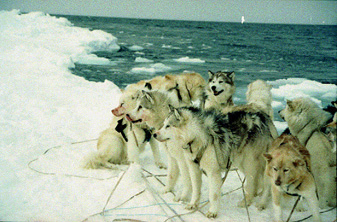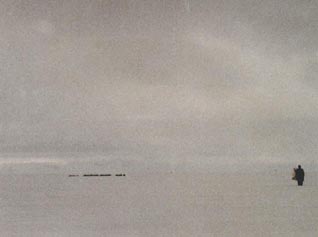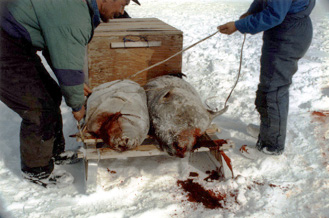Table of Contents
*
Featured Inuit Dog Owner: Ove Nygaard
*
An Amazing Lead Dog: The Story of Tatra
*
A Mystic Reunion
*
Katan, the Greenland Pup
*
Oregon Dune Musher's Mail Run
*
High Arctic Mushing: Part II
*
Bibliography: Inuit Sled Dog Research
*
Video Review: Atanarjuat, The Fast Runner
*
Book Review: To a Lonely Land I Know
*
IMHO: Visibility
Navigating This
Site
Index of articles by subject
Index
of back issues by volume number
Search The
Fan Hitch
Articles
to download and print
Ordering
Ken MacRury's Thesis
Our
comprehensive list of resources
Talk
to The Fan
Hitch
The Fan Hitch
home page
ISDI
home page
Editor: Sue Hamilton
Webmaster: Mark Hamilton
Contents of The Fan Hitch Website and its publications are protected by international copyright laws. No photo, drawing or text may be reproduced in any form without written consent. Webmasters please note: written consent is necessary before linking this site to yours! Please forward requests to Sue Hamilton, 55 Town Line Rd., Harwinton, Connecticut 06791, USA or mail@thefanhitch.org

Twelve miles off shore Hamilton photo
Mushing in the High Arctic: Part II
by Sue and Mark Hamilton
The rules of etiquette and safety when you're out camping in these here parts is that if nature calls and you have to leave the tent when everyone else is sleeping, you should wake up someone and tell them you are leaving the tent. I wasn't aware of this while on Banks Island several years ago at a camp set up by our Inuit friends for hunting polar bear, and it very nearly cost me my life... not a victim of a bear but of our Inuit hunter who woke to hear funny crunching footsteps outside the tent. He was on the verge of cutting his way out of the tent to get to the rifle and start shooting, when I finally unzipped the flap and came in out of the bone chilling cold. Here in the North Baffin, at Button Point on Bylot Island, I figured that this time would be different because unlike on Banks where we traveled by snow machine, if there was bear trouble, the dogs would alert us to the danger.
So, my day began by making yellow snow and not even the dogs took note. It wasn't long before the rest of the crew roused and in no time the primus was perking along and breakfast of tea, coffee or cocoa and toast or bannock was served. We then began packing up the essentials for the day's trip to the floe edge. Originally, we were supposed to be camping out there, but the weather being so warm, our guides had decided it was not a good idea. Their reasoning would became abundantly clear upon arriving at our destination. With qamutiit loaded, the very eager dogs leaned into their harnesses and we were off. I was uneasy looking behind at the shoreline campsite getting smaller and smaller knowing that at this point, land straight DOWN was closer than the land we left. Foolish me, not being able to swim was irrelevant. Hypothermia would kill in a matter of seconds if one was unlucky enough to fall through six feet of ice.
Soon after getting underway, our expedition took on the tone of real purpose. Panueli became very alert, scanning everywhere looking for dog food. Teeny black dots that I would mistake for lint floating on the surface of my eyeballs brought keen interest. Seals were hauled out onto the ice, basking in the brilliant sunlight. The dogs were directed towards our intended prey. About a mile away, we stopped. With a four-foot-square shield of white fabric set onto two wooden crosspieces in one hand and a rifle in the other, Jayko set off. The process was always the same every time we spotted seals: stop, set up, about thirty minutes of painstaking stalking, two rapid shots fired, the dogs jumped to their feet and raced to the scene (and you'd BETTER be on your qamutiq when they took off!). Results ranged from the seals slipped back down their breathing holes before shots were fired, seals were wounded but slipped back into the breathing holes, never to surface again, seals were killed by a bullet to the spine so they could not slip back into the water. In the case of wounded animals, we always waited around for a long time to see if a body could be retrieved. The waste of a seal was something no one wanted. This day we managed to bag two ringed seals, nice fat ones. They were quickly tied to the back of one qamutiq and then we picked up the pace to the floe edge.

Carrying a blind and a rifle, Panueli
sets off on a long
stalk Hamilton photo
Before we left Pond Inlet for the floe edge, we had to pass an inspection. Our outfitter came to the Sauniq Hotel to check out all our gear to make sure we were fit to travel. He told us about our guides, a little about appropriate "etiquette" and before wishing us a great trip, gave each of us the same very stern admonition - with all the solemnity he could muster, he implored "DON'T GO NEAR THE FLOE EDGE!" which we dutifully repeated back to him. He was a pretty easy going guy for the most part, so the intensity of delivery of his statement commanded our attention and respect. Despite never having been at a floe edge before, we had a pretty good notion of why we shouldn't go near one.
Twelve miles from shore, the two teams stopped at a "line in the snow". It was an abrupt transition from the fairly dry stuff, to a field of slush, a hundred or so yards of it, which ended in another abrupt transition, the very edge of the ice. Jayko left his qamutiq, pulled out a pole sort of thing from the qamutiq, then proceeded to walk out onto the slush. My pulse quickened. He poked the "divining rod" here and there, looked around, returned to the sled and without any discussion commanded his team forward. Our team ran along side. My heart pounded as I watched and listened to the dogs' feet sloshing through the fairly deep slop. They finally stopped, not wishing to leap the "mother of all leads", the other side of which was Greenland! Our outfitter's words rang in my ears. If ever there was a time to have faith in the wisdom of our Inuit guides, now was it, so I got off the qamutiq and joined the others at the floe edge. What an exhilarating experience! Floe edge to the left and to the right as far as the eye could see and nothing but open water straight ahead. The ice, only about four inches at the very edge, undulated beneath our feet. While the dogs rested, we broke out the primus and enjoyed a "mug up" of tea, some bannock and assorted other lunch stuff. A huge pool of blood on the ice nearby indicated that a walrus had been butchered there a few days before. Our attention was drawn out to sea as we were treated to a parade of beluga and narwhal. They were so close, we could hear them breathing through their blowholes. Too bad, I thought, that we weren't prepared for this kind of hunt. The dogs would eat like royalty.
We began the journey back to camp. It was a long ride and we once more had plenty of time to contemplate our latest adventures. How were we going to tell our outfitter what had happened without giving away that we ignored his stern warning? Probably the same way we had all made a pact not to tell him how much fun we made of his menu. Just before camp, we had to cross a lead. Jayko's team was out front. His dogs were younger and less experienced but with their capable leader, the first few leapt to the far side. However, some of the dogs were more hesitant so when several balked at the last moment, many went in the water. Jayko "encouraged" his dogs across with the sealskin whip. Following behind, Panueli was busy orienting his team 90 degrees to the lead, but as we got closer to the other team, his dogs panicked and turned so that the left runner of the sled began approaching parallel to the edge of the lead. Then one of his dogs dropped into the black water. The qamutiq continued onwards directly towards the dog clambering to get out, and we faced the double disaster of crushing the dog's skull and having the qamutiq slip sideways into the lead. Suddenly Panueli jumped off the qamutiq and shoved the front of the right runner perpendicular to the lead while urging his dogs to leap across. The left runner crossed over the near side of the lead just as the frantic dog's head dipped below the edge of the ice. But with the length of his tug line taut underneath the sled, he was trapped in the frigid water and had ceased to struggle. Mark jumped to his knees ripped off his mitt and reached overboard to drag out the soggy dog. We stopped the teams on the camp side of the lead to sort out the lines. Mark wrung out his sleeve, too much adrenaline pumping for his arm to notice the stinging cold. We reached camp after maintaining a pretty good pace. It was a toss up as to who was more relieved to be back - me, for once again being on fairly steady surface or the dogs, because they knew that dinner was forthcoming.
While the rest of us began unloading the qamutiit, unpeeling a few layers of clothing, and setting the primus to running, Panueli began preparing dog dinner before a crowd of anxious witnesses. The seals were not skinned. The bellies were slit open and the insides, from trachea to rectum were removed and divvied up. The rest of the carcass was cut into pieces which were then tossed to each dog. The more dominant one of each pair got the first serving. The subordinate partner waited for his or her turn. The distribution seemed random with the exception of the blubber layer. That was portioned out more evenly. Dogs' needs having been met, we humans set down to our routine, the ceremonial perusal of the menu, our collective decision, the meal, after dinner chores and lots of good conversation until one by one we collapsed into our sleeping bags.

Everyone eats tonight Hamilton photo
As hungry as I assumed the dogs had been, several chunks of seal remained uneaten the following morning: a piece of blubber, a flipper, part of a skull. After breakfast, we set out for Cape Graham Moore, where hundreds of thousands of kittiwakes and murres nested. By noon, travel became difficult as we began to encounter some skyscraper-like pressure ridges. The dogs were awesome, picking their way around some and over other smaller chunks of up-ended sea ice. But it became obvious to Jayko and Panueli that there was no way were ever going to reach our destination. They had driven the teams into a narrow, exitless ice canyon. Two fan hitches doing "come arounds" in that terrain was a sight to behold! After re-aligning the qamutiit, we stopped for a long and leisurely lunch. Mark clambered over a ten foot pressure ridge "to see a man about a dog" while the rest of us wandered around the immediate area, where we discovered the not-too-old tracks of a male bear. Visions of headlines flashed through my mind, "Wife Returns from Arctic with Husband's Mauled Body" as I waited for Mark to return. So much time passed that even our guides were beginning to notice my nervousness. Despite the lack of any indication from the dogs that a bear might be lurking nearby, Jayko and Panueli decided to go looking for Mark, just as his head FINALLY peered over the top of a tall pressure ridge. He denied having taken a magazine with him and we all chuckled with much relief. It had begun to snow when we packed up for the return to base camp. Having arrived early, about 3 P.M., we just hung around reading, visiting with the dogs, organizing our gear or taking long naps. We ate a late dinner and traded stories up until sometime after 1 A.M.. Hell, it was still so bright out no one took notice of the time.